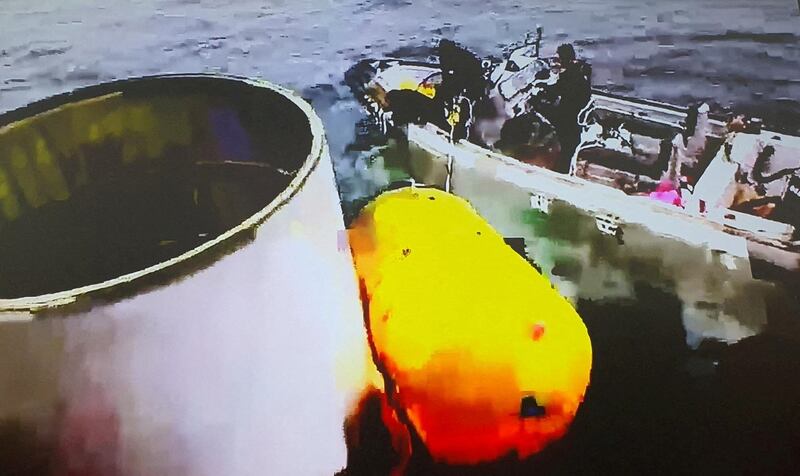On the heels of a failed spy satellite launch on Wednesday, North Korea vowed that a second launch would come soon, state media reported.
Taking off from the Sohae Satellite Launching ground at 6:27 a.m., the Malligyong-1 satellite mounted on the new-type Chollima-1 rocket lost thrust over the Yellow Sea, the state-run Korean Central News Agency, or KCNA reported.
The second stage of the rocket engine did not ignite properly, the report said, citing remarks made by a spokesperson from the National Aerospace Development Administration.
“Scientists, technicians and experts concerned [will] start discovering concrete causes,” KCNA said. After determining them, the scientists will “take urgent scientific and technological measures to overcome them and conduct the second launch as soon as possible through various part tests.”
Had the launch been successful it would have been the first time North Korea managed to place a reconnaissance satellite in its proper orbit. In seven attempts, only two satellites have reached orbit but both failed shortly after, U.S.-based satellite imagery expert Jacob Bogle told RFA’s Korean Service.
“It's a cliché to say that ‘space is hard’, but that's because it is. Failures commonly happen in both government-led space programs like the ESA as well as in privately-funded programs such as SpaceX,” said Bogle.

Bogle said it was very likely that North Korea would try again.
“The launch window was from May 31 to June 11, and they launched on the very first day of that window. We don't know what the internal decision-making process was but this could have been a rushed launch,” he said. “North Korea is the only country in the region without a reliable spacefaring capability, and Kim Jong Un has placed a lot of importance on acquiring it. … North Korea will likely try another satellite launch in the near-term.”
North Korea’s account of the failed launch is likely true, the Rand Corporation’s Bruce Bennett told RFA.
“This is possible, but other failures could also have happened. Kim has already promised to try again, so I think we can expect it,” said Bennett.
The goal of the launch was to put the spy satellite in a polar orbit, optimal for spy satellites, he said.
“A polar satellite travels roughly over the North Pole and the South pole as it circles the Earth. It flies at a much lower altitude, usually 200 to 1,000 km,” said Bennett. A polar orbit is usually used for reconnaissance … [and] lets them see areas all over the Earth as the Earth turns, and the altitude is low enough for relatively good pictures on a periodic basis (weekly) for any given location.”
Renewed condemnation
Despite its failure, members of the international community reminded North Korea that the launch, even despite its failure, violated U.N. resolutions meant to limit Pyongyang’s missile and nuclear capabilities.
“The EU strongly condemns the Democratic People’s Republic of Korea (DPRK) launch using ballistic military technology that occurred on 31 May,” Nabila Massrali, the regional bloc’s Spokesperson for Foreign Affairs and Security Policy said in a statement. “The EU calls on the DPRK to cease all actions that raise tensions and instead choose the path of dialogue with the main parties.”
The International Maritime Organization’s Maritime Safety Commission adopted a resolution that condemned North Korea for conducting the launch without proper notification and for not adhering to UN resolutions, and called for North Korea to “cease unlawful and unannounced ballistic missile launches across international shipping lanes.”
Lawmakers Anne-Marie Trevelyan of the U.K. and Young Kim of the U.S. also wrote tweets condemning the launch.
“Kim Jong Un's consistent & rogue aggression must be taken seriously by the United States & our Indo-Pacific allies,” Rep. Kim (R-Calif.) said. “We must stand firm in holding him accountable & working toward complete, verifiable, & irreversible denuclearization of North Korea.”
Reported by Lee Sangmin and Kim Soyoung for RFA Korean.
